 Petzlover
PetzloverBengal is originated from United States but Red Point Siamese is originated from United Kingdom. Both Bengal and Red Point Siamese are having almost same weight. Bengal may live 4 years less than Red Point Siamese. Both Bengal and Red Point Siamese has same litter size. Bengal requires Moderate Maintenance. But Red Point Siamese requires Low Maintenance
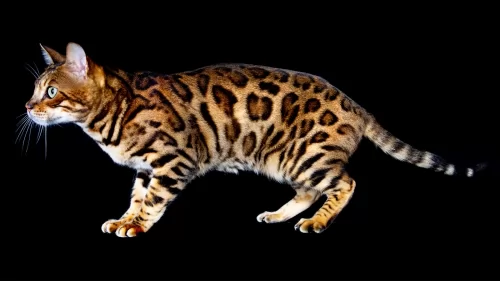 What an exquisite coat the Bengal cat has. It looks like the coat of a wild cat and can have spots, marbling, and rosettes, but it is domesticated, developed from hybrids – the spotted Egyptian Mau and the Asian Leopard cat.
What an exquisite coat the Bengal cat has. It looks like the coat of a wild cat and can have spots, marbling, and rosettes, but it is domesticated, developed from hybrids – the spotted Egyptian Mau and the Asian Leopard cat.
It is the only domestic breed of cat that has rosette markings. It is Jean Mill of California that you associate the Bengal cat with, and she conducted a number of graduate classes in genetics.
The Siamese cat remains one of the most famous among the cat breeds. The Red Point is also known as the Flame Point Siamese cat. This breed of Siamese is rare.
It is believed that when the seal point Siamese breed was first introduced to the U.K in the 1930s they were bred with cats that carried these orange genes such as the tabby or tortoiseshell British shorthair cats.
Breeders wanted to produce a Siamese-style pointed cat in colors other than the traditional shades,
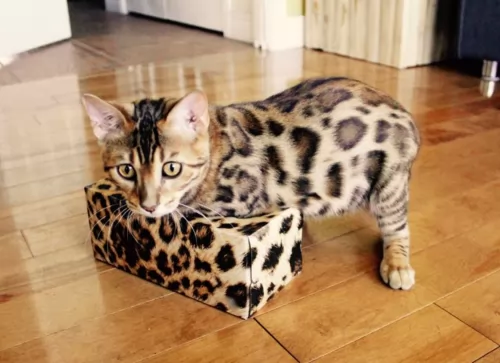 The Bengal looks like a wild cat and it can weigh up to 7kg. It can reach a height of 70cm with long, muscular legs and almond-shaped eyes which are green or blue.
The Bengal looks like a wild cat and it can weigh up to 7kg. It can reach a height of 70cm with long, muscular legs and almond-shaped eyes which are green or blue.
When it comes to the coat of the Bengal cat, it has a wide variety of colors and patterns. The cat can be brown, black, red, grey, spotted, clouded, ticked or rosette.
There are Bengal breeders that claim that their Bengals are hypoallergenic so that they won’t cause an allergic reaction with their owers. This is something that hasn’t been scientifically proved and in fact many will say that there isn’t such as thing as a hypoallergenic cat.
The Bengal is a medium to large-sized cat, being long and lean and muscular. As a low shedder, it is believed the Bengal is a hypoallergenic cat breed – a cat less likely to cause an allergy with its human owners.
When you bring a Bengal cat into your home, you’ll find they are energetic, smart, and playful and they love cavorting around in water.
People who have owned a Bengal say that the cat is friendly and that it enjoys interacting with humans. They’re cats capable of forming strong bonds with their human family, becoming affectionate and loyal. They in turn want to receive lots of loving attention.
They’re intelligent too and are quick to learn. You have to remember that these are part wild cat and that they are only classed as tame from the 4th generation (T4).
The cat has wild traits so it is only natural that it likes to hunt so don’t be alarmed when your Bengal presents you with dead mice, moles, and birds.
These cats are medium-sized, muscular cats and can weigh between 3 and 6kg. The neck is fairly long, the legs long and lean too.
These attractive cats have got reddish-gold points and with their sparkling blue almond-shaped eyes they really are a beautiful breed of cat. Like other Siamese kittens, the Redpoint kittens are also white when they are born. Variations of the Red Point Siamese cat should always have creamy-white bodies with the reddish-orange points.
The coat is short, thick, and silky. The points start emerging later on and deepen as the cat matures. You may see reddish freckling over the face, legs and paws as well as the tail.
The Redpoint Siamese is playful, social, friendly and intelligent. They love nothing more than to be around their human family but don’t warm too well to strangers.
They tend to become possessive over what they feel is theirs. They are also very vocal and have a different meow to express their feelings. These are definitely cats that don’t like being left alone for long periods of time. They want to be occupied and entertained and will need lots of stimulating toys to keep them occupied and exercised.
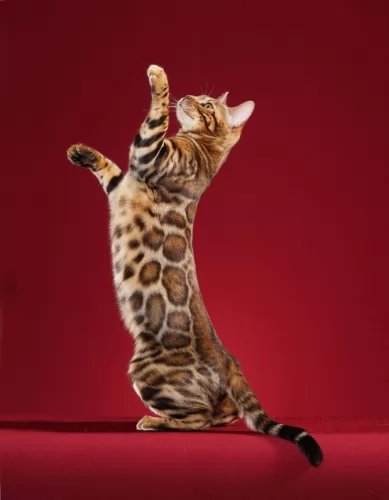 Bengal cats are intelligent and just like a dog he is clever at learning tricks and can even be taught things such as ‘sit’, ‘fetch’ or ‘lie down’. They actually make great companions as they are sensitive to their owner's moods and can even recognize human gestures and adapt their behavior to their owner's mood.
Bengal cats are intelligent and just like a dog he is clever at learning tricks and can even be taught things such as ‘sit’, ‘fetch’ or ‘lie down’. They actually make great companions as they are sensitive to their owner's moods and can even recognize human gestures and adapt their behavior to their owner's mood.
They’re vocal cats too and they like to communicate about their needs, being able to meow in different tones. They’re active cats and they want active owners – those who can spend time with them playing and even going on walks and hikes.
The Bengal certainly is a wonderfully companionable cat.
If you’re looking for an exceptionally affectionate cat, then the Red Point Siamese is full of personality and will suit you very well as these cats are remarkably affectionate.
They always take an interest in what their humans are getting up to. They’re capable of forming strong bonds with their human family. They are also curious and intelligent and they can be taught a few tricks too.
They’re good-natured with their own human family but are not friendly with strangers.
They’re also energetic and agile and love to leap up onto a perch or your shoulders and survey his world from there.
If you want a cat that is an involved member of your family and an awesome companion, the Red Point Siamese will fit into this category superbly well.
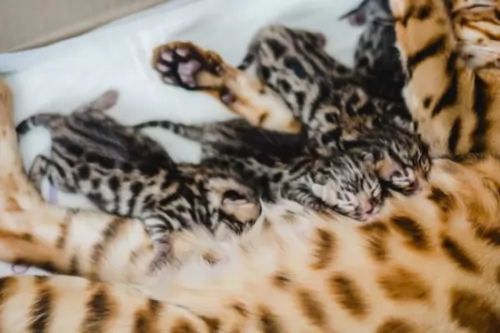 Hypertrophic cardiomyopathy (HCM) is a concern with the Bengal cat breed and this is a disease where the heart muscle becomes thick and unable to pump blood properly.
Hypertrophic cardiomyopathy (HCM) is a concern with the Bengal cat breed and this is a disease where the heart muscle becomes thick and unable to pump blood properly.
It’s a common genetic disease in Bengal cats. Cats used for breeding need to be screened each year to ensure no hypertrophic cardiomyopathy is present.
Another problem with the Bengal cat is Progressive retinal atrophy or PRA. Anyone wanting to breed Bengals should have their cat tested for this eye disease as the disease can lead to blindness.
The Red Point Siamese isn’t going to have any more cat diseases than any other cat. Any cat stands a better chance at good health when they have an exceptionally healthy diet.
Have your cats neutered or spayed to prevent unwanted kittens and to promote better health for your cats.
Watch out for diseases such as Progressive retinal atrophy (PRA), a genetic eye problem where the cells deteriorate. The disease, though not painful, can lead to blindness.
Obesity in cats, but particularly a slim, athletic cat such as the Red Point Siamese, can bring on a host of health issues. Overfeeding your cat isn’t a form of love but an irresponsible act. There are just too many dangers linked to being overweight to ignore. Excess weight can lead to joint problems as well as diabetes, and just getting rid of a little bit of weight can already result in increased overall good health.
Cat experts tell us that excess weight can shorten your pet’s life by 2 years. Get some tips on feeding your cat and keep him playfully active as well.
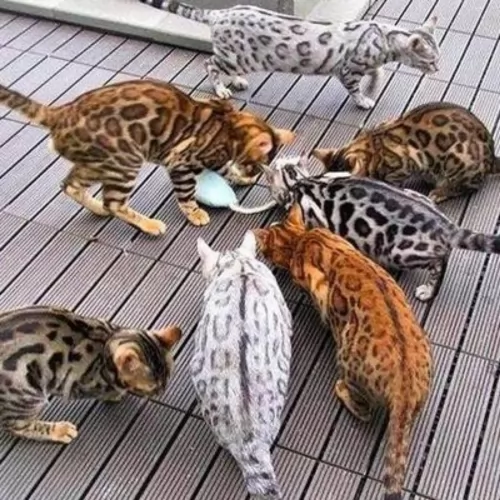 You will need a secured outdoor area for your Bengal cat where he can play and climb. He will need these for his activity levels as well as stimulating toys.
You will need a secured outdoor area for your Bengal cat where he can play and climb. He will need these for his activity levels as well as stimulating toys.
Provide feeding and water bowls and also make sure that you provide your Bengal with a shallow swimming pool as this cat loves water.
The Bengal is a healthy cat breed so it is important to provide your pet cat with the best food there is and to ensure he gets checked out at the vet every year.
Most hybrid breed owners provide raw food as these cats are often sensitive to commercially manufactured food. Having said that, there are high-quality prepared cat foods that will provide your Bengal with everything needed for a healthy life.
Look at providing your pet with a good supplement to ensure your furry friend has every chance to be healthy and happy.
With good care these cats cat reach 15 – 20 years of age.
The Red Point Siamese cat does shed but because it’s a low shedding cat, it becomes low maintenance. They usually shed in spring and again in the autumn. The short, easy-to-care-for coat can be brushed once a week.
Cats are strict carnivores, and just as a wild cat feeds on animal protein, so it is with a domesticated cat. They require a host of nutrients and only the best, high-quality foods contain these nutrients.
You get dry, semi-moist, and canned cat foods and the best commercial cat food manufacturers ensure that these foods have all the right balances of nutrients a cat needs.